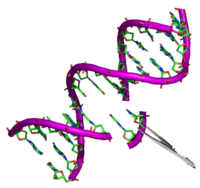
Photo from wikipedia
Based on norm activation theory, a research framework was built to explore the food waste reduction behavior when consumers eat out. The framework included behavior intentions and four psychological factors:… Click to show full abstract
Based on norm activation theory, a research framework was built to explore the food waste reduction behavior when consumers eat out. The framework included behavior intentions and four psychological factors: awareness of consequence (persons understanding that actions have consequences), ascription of responsibility (duty to respond), self-efficacy (belief in own skills and capacity), personal norm (individuals’ values to act by socially accepted rules and reduce food waste as a code of conduct and moral obligation). A total of 514 samples from different regions of China were collected through an online survey platform, and the research framework was tested by applying structural equation modeling (SEM). This study found that ascription of responsibility and self-efficacy can effectively activate personal norm to reduce food waste. Personal norm and self-efficacy had a significant positive effect on behavior intentions to reduce food waste. Specifically, self-efficacy had the greatest effect on personal norm, followed by ascription of responsibility, and on behavior intentions to reduce food waste, followed by personal norm. Interestingly, while ascription of responsibility and self-efficacy had an impact on personal norm, awareness of consequence did not significantly influence personal norm to reduce food waste, suggesting that emotional factors are more likely to trigger personal norms that motivate consumers to take action to reduce food waste than cognitive factors. Based on the findings, several suggestions are provided for more effective interventions by restaurants to promote food waste reduction behavior, such as information intervention strategies, displaying information related to food consumption, and reducing the size of plates for some meals.
Journal Title: International Journal of Environmental Research and Public Health
Year Published: 2022
Link to full text (if available)
Share on Social Media: Sign Up to like & get
recommendations!